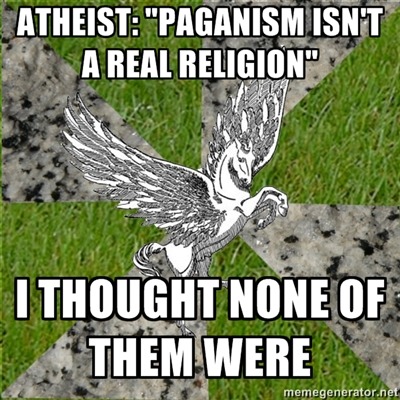Pseudo-Onkelos
Gonecrazy12345
Maybe you have experienced it, I'm not sure. Basically my existential crisis made me feel like I was literally going insane. I got to the point that I didn't even know if it was worth it expressing anything linguistically anymore, with people and with myself. My mind also got even more confused, because when I was having this thought that I couldn't express what I was thinking with language, I was reading Ludwig Wittgenstein's work. If you're not familiar with that philosopher, one of his important arguments is that language is a public bi-product and there's no such thing as a private language, and furthermore he proposed that all knowledge and thoughts could be expressed with language. Well this directly contradicted what I was thinking, which made me even more confused. There's much more to my existential crisis then that, but basically what happened in my experience was that I lost all confidence in any form of knowledge and any foundation of knowledge, which also had really negative impacts on me emotionally as well. I still think I'm getting over my existential crisis, but I'm definitely feeling and doing a lot better than I was just like 6 months ago.
The name is familiar to me. I recall you making a thread (or it could have been someone else) about language games and how language only has relevance to what is being discussed. In that thread, someone used Yu-Gi-Oh as an example.
Gonecrazy12345
The "failed" Documentary Hypothesis? To my knowledge the Documentary Hypothesis is the most legitimate theory on the authors of The Bible. To my knowledge, the majority of well accredited biblical scholars who actually post peer reviewed studies, accept the Documentary Hypothesis. For example people like Bart Ehrman and Richard Elliott Friedman.
There are those who still accept the Mosaic view of the Torah. Some may still accept it, some may still promote it. I am of the opinion that Moses didn't write the Torah by himself, but I do not readily accept the Documentary Hypothesis like I used to. I am indifferent about it. Here is an
article. Feel free to read it at your leisure.
Gonecrazy12345
So you still believe in Yahweh, but are you also a Pagan? For example, I know that in parts of Genesis (Forgot if it was J or E that called God "El" ) and of course El was actually one of the pagan god's of the early Isrealite religion along with Yahweh who was one of the god's as well. But then of course there's the passage in Exodus that says that El and Yahweh are the same God (but according to the Documentary Hypothesis, the person who wrote this passage in Exodus was an author much later than J and E).
I'm just confused with what you believe now. You don't call yourself a Christian, and I'm assuming you don't consider yourself a follower of Judaism either, but you believe Yahweh (or do you believe a different God and believe Yahweh is a false God of The Bible? Just like how according to the Documentary Hypothesis, much of the Torah acknowledges pagan God's when you recognize that many of the books in the Torah were written by multiple authors at different times in Israel's history). Do you believe Jesus died for your sins anymore?
Yes, I still believe in Yahweh, although not in the same way many Jews and Christians do today. I don't have a label for myself, unless you want to call me a polytheist.
'El was the name of the chief god in Canaanite religion. It is also a generic Hebrew word for "god", which can be applied to any god, including the god of Israel.
When I was a Christian, I thought that if I was not one, I'd want to join Judaism. The problem with that was I needed a rabbi to convert, and it isn't a religion you can just join. So I decided I would just study further on ancient Near Eastern religion.
I do not believe Jesus died for my sins anymore.
1. Yeah I remember that thread. I'm still struggling to completely understand Ludwig Wittgenstein. He sounds interesting to me though. Right now I'm reading a book on the philosophy of language by a logical positivist. I know that Bertrand Russell and Wittgenstein used to be logical positivists but then they abandoned it later on, Wittgenstein specifically dismissed in his book that he didn't actually get to complete in his life time, The Philosophical Investigations. I think that if I understand what he used to believe, and if I read a book that get's into philosophy of language, that I will then be more equipped to understand Ludwig Wittgenstein.
2. Thanks for the article, I'll read it later on. Yeah after reading the Torah, and specifically reading Richard Elliot Friedman's The Bible with Sources Revealed, I personally am really skeptical of the idea that Moses wrote the Torah himself. I'm no expert and no linguist, but even I could see a world's difference in books when I read Deuteronomy compared to the other books. Deuteronomy just read completely differently than the other books, it was completely obvious to me as soon as I started reading Deuteronomy that it was written by someone completely different than the other 4 books. Also another question I have is, the people who believe Moses wrote the Torah, do they actually have linguistic, archaeological, historical, and other "scientific" reasons to believe that? Or are these people just taking it for granted that Moses wrote the Torah because that's their theological and religious view?
I've also heard biblical scholars claim that it's questionable whether Moses (as described in The Bible) was even a real person, and also it's debatable whether the story in Exodus of the Jews being enslaved by the Egyptians and them roaming around the desert for 40 years even happened. I've read that there's little to no evidence that these events even happened.
3. Hmm okay, well I guess it really doesn't matter what I could label you anyways, I was just curious what you believe now. It seems like to me, you still are learning about the early Near Eastern religions and are still in the process of forming your beliefs.



